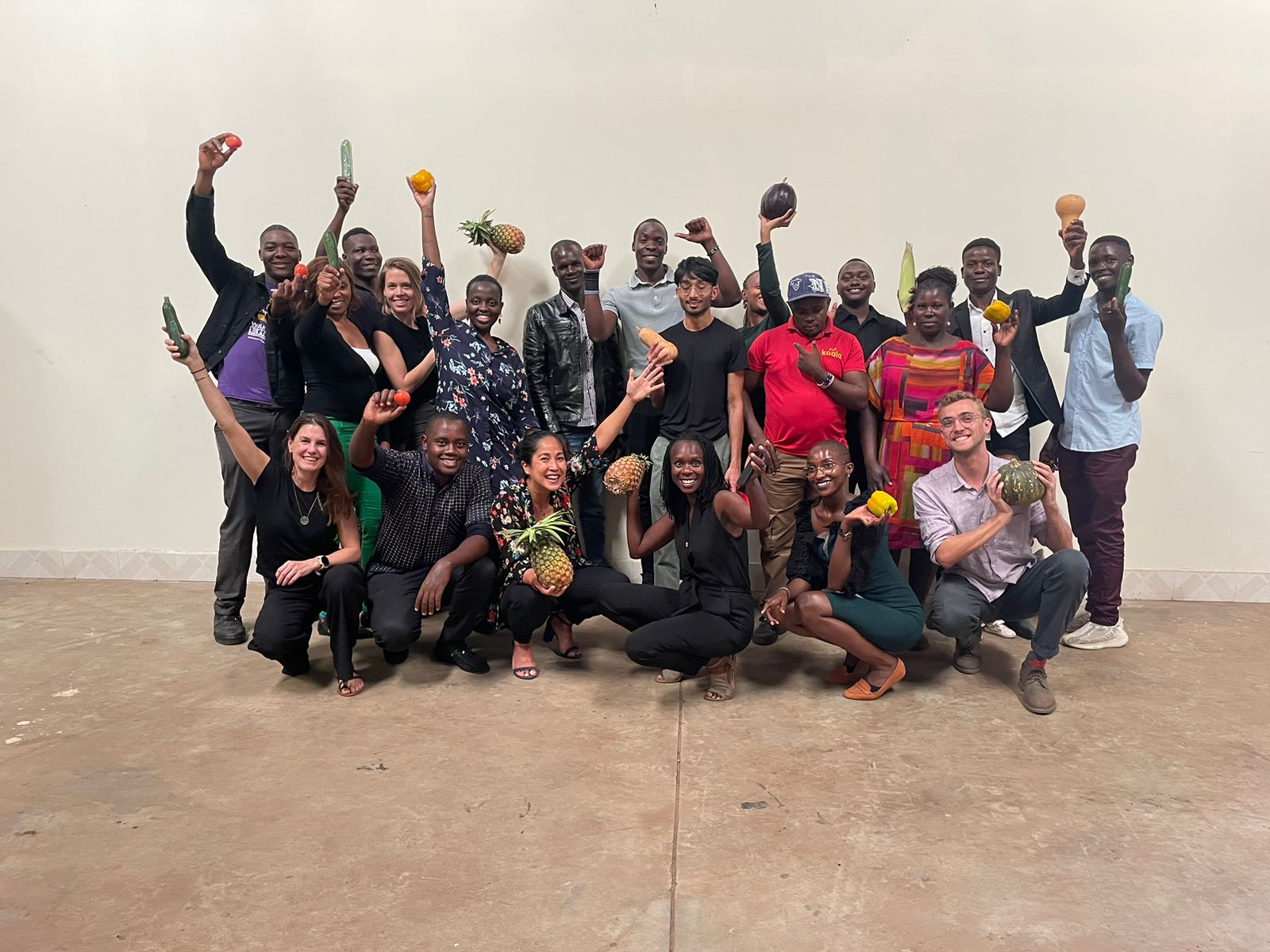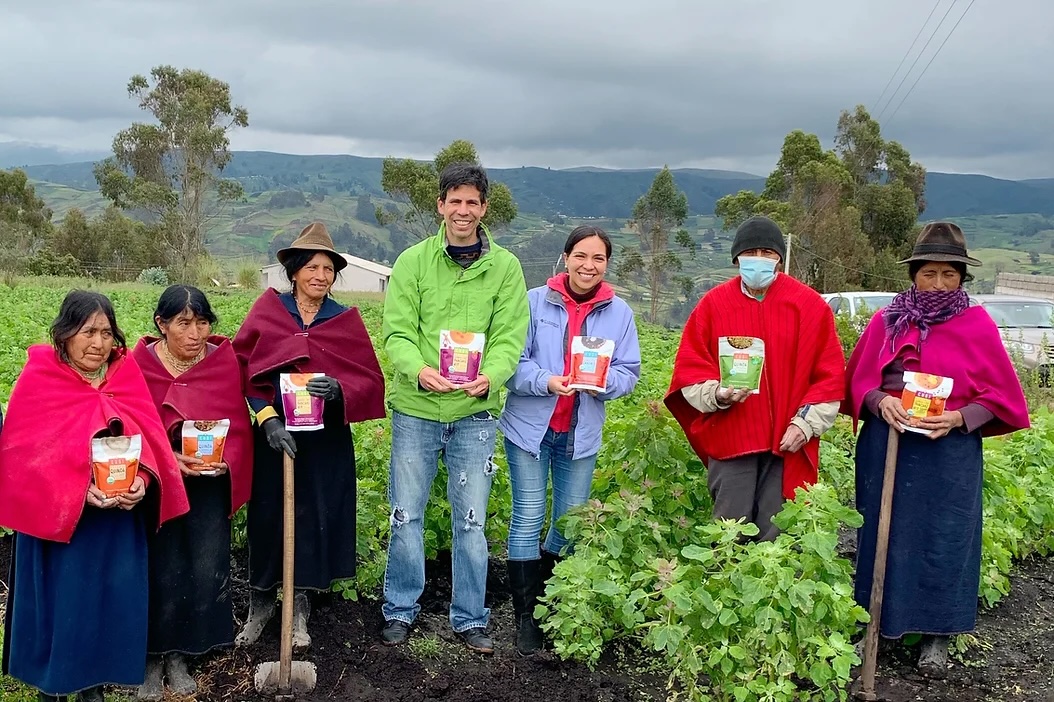ImpactAlpha, December 19 – In Africa, fintech data is exposing climate vulnerabilities. In Latin America, investing in smallholder farmers means investing in regenerative agriculture. In Asia, social bonds target both gender and climate impacts. Climate risks and opportunities are now central to nearly every impact investment across emerging markets.
The billions of people living in low- and moderate-income countries are on the frontlines of climate change. The UN Sustainable Development agenda, including poverty elimination, food security and gender equality, hinges on fostering climate resilience and green economic growth, which require trillions of dollars of climate finance.
The tone is both urgent and (refreshingly) optimistic. Despite economic hardship, inflation and intensifying climate impacts like drought, “we are looking at the opportunity,” Kenyan President William Ruto declared at the Africa Climate Summit in Nairobi in September.
“We have an opportunity to unlock the renewable assets available on our continent, whether they are minerals, whether they are energy, whether it is our young people, whether it is smart agriculture,” he said. “We have an opportunity to turn the climate crisis into an opportunity for our continent.”
World leaders took steps in June at the Summit for a New Global Financing Pact to upgrade the global financial architecture that has saddled low- and middle-income countries with debt and deprived them of resources to climate change. In Nairobi, African leaders called for a global carbon tax on high-polluting countries to address lower-income countries’ climate capital needs. A spate of international development finance deals were inked on everything from energy infrastructure, to water and sanitation services, to ecosystem restoration. Investors are even finding pathways into the hardest markets, like Chad and Burundi, using creative de-risking tools and blended finance.
The tendency for optimism also applies to small business finance. Fund managers trying to direct private capital to address the issue can spend years raising $5- $10- or $20 million funds. “It’s shifting,” Samuel Yeboah of Mirepa Capital Advisors in Ghana told ImpactAlpha at the recent Collaborative for Frontier Finance convening of emerging market fund managers in Cape Town.
Mirepa and peer African fund managers in Kenya, South Africa, Nigeria, Tanzania and Uganda notched first investments and first closes this year, despite difficult fundraising conditions. Supporting them: catalytic capital, local institutional investors and fund of funds.
Are investors doing enough to mitigate those risks and seize those opportunities? Certainly not. But a raft of new funds, initiatives and instruments are clearing obstacles to institutional, and increasingly local, capital.
Liist, ImpactAlpha’s monthly selection of impact funds actively raising capital, has featured dozens of first-time, emerging-market fund managers addressing the climate crisis along with gender equality, food security, economic inclusion, and preservation of life on land and in the seas.
Many new ideas and strategies will fall short or outright fail. Impact investors must be more willing to acknowledge and share lessons, argues Amrita Bhandari of Acumen, which this year published a report on its portfolio failures and lessons. “In a world of dire problems and limited resources, the only real failure is to keep making the same mistakes.”
What to watch for in the coming year:
Climate-lens investment angles
Established emerging market investment managers are recognizing the necessity of embedding a climate lens in their strategies to serve low-income and emerging consumers. LeapFrog Investments, which has raised more than $2 billion to invest in financial inclusion and healthcare access since 2009, this year announced a $500 million climate strategy and accompanying team. IIX has integrated a climate resilience angle into the last three of its Women’s Livelihood Bonds. Mercy Corp Ventures and BFA Global’s Catalyst Fund have for years been early backers of new solutions to financial inclusion; they’re ramping up their focus on climate-related fintech and small business software.
Investors in India especially are keying in on climate opportunities despite mixed signals from policymakers.
Off-grid energy providers did particularly well in raising capital this year, largely by leveraging investor interest in the broader energy transition momentum. Companies making, selling and servicing small solar lighting products and solar home systems for years persisted in building a business sector with philanthropic and concessional impact capital. Commercial banks, long wary of the risks associated with serving remote, unbanked customers, are now investing via securitized loans issued by d.light, Sun King, M-Kopa and others.
Clean cooking has reemerged as a hot impact investment opportunity. Providers like Koko Fuel, Bboxx and Burn Manufacturing are measuring their environmental impact to tap carbon markets and pass cost-savings on to their customers.
A myriad of investment funds, instruments and tech innovations are working to improve the efficiency and climate resilience of agriculture and food, on which the majority of emerging market household livelihoods depend. Interventions in these markets tend to be too young, small and siloed. The agrifood overall is greatly underfunded, relative to its climate and social impact potential. A new framework from the UN offers up themes and considerations to categorize solutions and guide capital for deeper impact.
Emerging trends we’ll be watching: investment strategies at the intersection of climate and gender and climate and health. Dozens of investment managers including IIX, MCE Social Finance, EcoEnterprises Fund are already pursuing a climate + gender strategy; investors are flagging climate + health as an emerging theme.
“We are here to lead the way,” said Rose Maizner of Heading for Change, which is partnering with ImpactAlpha to highlight emerging investment strategies at the intersection of climate and gender. Capital flows are small but growing. The ecosystem role of Suzanne Biegel’s legacy fund, said Maizner, is to “to break down barriers other investors might be feeling to come into this space, whether it’s not knowing how to evaluate funds and opportunities, not knowing what funds are out there, or what this universe looks like.”
Go deeper:
- https://impactalpha.com/zola-sun-king-and-m-kopa-offer-three-paths-to-africas-off-grid-energy-future/
- https://impactalpha.com/acre-africa-insuring-farmers-against-crop-failures-and-climate-change/
- https://impactalpha.com/the-100-billion-opportunity-in-climate-finance-accountability/
- https://impactalpha.com/these-fund-managers-are-putting-climate-gender-strategies-into-action/
- https://impactalpha.com/frontline-communities-hold-the-keys-to-inclusive-gender-and-climate-finance/
Gender as a pathway to alpha
Financial institutions and social enterprises, like Pro Mujer in Latin America, are increasingly issuing social and gender bonds to finance female business owners. Gender bonds, in particular, are gaining traction among investors, says Laetitia Hamon, who leads sustainable finance at the Luxembourg Stock Exchange.
Pro Mujer has tapped Argentina’s capital markets to issue a pair of social bonds focused on gender. A “diversity and inclusion social bond” issued in August by Ecuadorian savings and credit cooperative Jardín Azuayo will support lending to women and low-income entrepreneurs.
“Adapting financial instruments to market conditions is essential for the growth of sustainable finance in emerging markets,” says Pro Mujer’s Carmen Correa.
Go deeper:
- Gender lens investors at SOCAP23 look beyond the ‘business case’ to move capital to women
- Through a gender lens in Latin America, investors see opportunities for impact and alpha (videos)
- With gender bonds, Pro Mujer puts Argentina’s capital markets to work for female entrepreneurs
Creatives and catalysts
As the impact investing industry has grown, so has the spectrum of standardized and commoditized funds and products designed for scalability. It’s always been a field of creatives and doers, however, and creative finance minds continue rolling out new structures and products to push the boundaries of where and how capital flows.
The Liist features dozens of first-time fund managers with new models for investing in small businesses, energy access, financial inclusion, ecosystem restoration and more. Latin American entrepreneurs and fund managers in particular are coming to the market with new opportunities to invest in biodiversity and land conservation and restoration (they have been for awhile). Natural systems offer “the greatest climate mitigation potential,” says Laura Ortiz Montemayor, whose investment firm Regenera Ventures takes an equity stake in Mexico’s farms and works with farmers to adopt regenerative techniques. “The more we embrace the complexity, and nature’s intelligence, the more we will be aligned with it.”
A smaller pool of backers are stepping up with anchor capital, catalytic grants, working capital and technical assistance. MCE Social Capital leverages donor capital to de-risk small business and agriculture investments in emerging markets. The Visa Foundation is providing grants to help women-led funds in Africa get off the ground; female fund managers say such catalytic grants are essential to setting up operations and building pipeline and track record. The Catalytic Climate Finance Facility has seeded half a dozen new finance instruments. The MDB Challenge fund is spurring development finance innovation.
As international development finance institutions face mounting pressure to be more catalytic in their investment strategies, it’s local institutional investors and fund of funds like Mastercard Foundation’s Africa Growth Fund that are showing up to anchor new strategies, such as Africa’s small business-finance funds. Traction is slow but building: in addition to Mirepa in Ghana, Inua Capital in Uganda, Aruwa Capital in Nigeria, SME Venture Fund in Tanzania, Chui Ventures in Kenya, and WIC Capital in Senegal all notched anchor investments. Secha Capital in South Africa and pan-Africa-focused VestedWorld are raising second funds.
What to watch for: more local-, women- and Indigenous-led funds. Indigenous fund managers and financial intermediaries in the US, Canada and Australia are ushering capital and resources into their communities while sharing how their communities build inclusive economies while protecting and caring for nature. Indonesia’s Nusantara Fund is among the few Indigenous-focused funds ImpactAlpha as spotted in emerging markets. We’ll be on the lookout for more in 2024.
Go deeper:
- https://impactalpha.com/regeneration-and-risk-taking-overheard-at-the-latin-american-impact-investing-forum/
- https://impactalpha.com/blended-finance-stars-as-cop28-seeks-to-unlock-climate-capital/
- https://impactalpha.com/funds-of-funds-provide-more-than-capital-for-local-investors-in-small-and-growing-businesses/
- https://impactalpha.com/to-catalyze-climate-capital-development-finance-institutions-are-pressed-to-publish-what-you-fund-2/
(A few more) honest conversations about failure
This year’s venture capital shakeout made flops and setbacks a tough topic to avoid. Companies aiming to digitize marketplaces, supply chains, and business operations, including Twiga Foods, Copia, Sendy raised billions of dollars, before pivoting, downsizing and in some cases closing completely once the funding taps dried up. What’s been exposed are models that were built for growth rather than sustainability or profitability.
Deals are still getting done. “These are such essential services that we know businesses will continue to have these needs,” said Amee Parbhoo of Accion Venture Lab, whose recent investments include Indonesian agri-marketplace and lender Semaai, and Pakistani financial services startup Trukkr. Investors now expect to see clear paths to profitability before cutting a check.
Acumen is one of the few impact investment firms to openly share portfolio failures and lessons. Zero Gap Fund, a $30 million initiative of the Rockefeller and MacArthur foundations to bridge the Sustainable Development Goal funding gap, has admitted to missteps, such as some of its agrifood investments in Africa. Taking stock of its investment journey, said Rockefeller’s Liz Yee, “made us reflect on what we felt was transformational impact, and on where we didn’t do so well.”
“Investors often accentuate the victories, but we all know failures occur just as frequently, if not more so, than successes,” wrote Acumen’s Amrita Bhandar. “We need real conversations about where we struggle, what we have learned, and what we need more of.”
Go deeper:
- https://impactalpha.com/trouble-at-twiga-and-copia-and-sendy-downturn-hits-east-african-logistics-disruptors/
- https://impactalpha.com/deal-spotlight-acumen-breaks-the-ice-on-failures-in-impact-investing/
- https://impactalpha.com/omidyar-network-india-to-shut-down/
- https://impactalpha.com/rockefellers-zero-gap-fund-is-fully-deployed-yet-gaps-remain/











